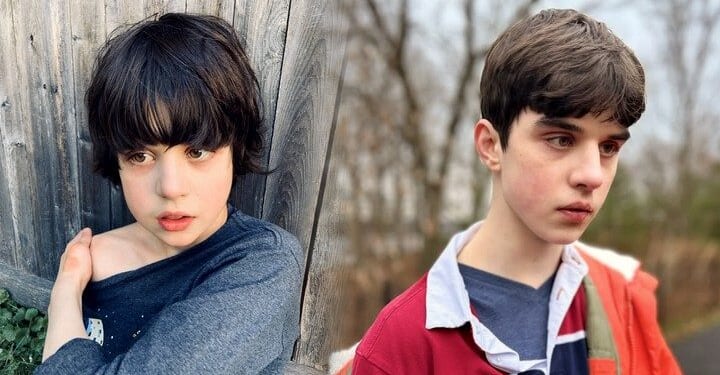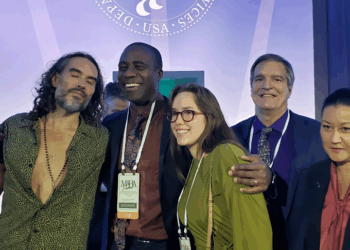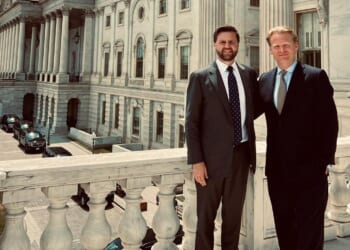The timing was almost unbearable for our family. We are parents of Finn, a sweet, tall, and often confounding young man, with a thick mop of shaggy brown hair and a diagnosis of profound autism. Last month, while the White House was holding a news conference to warn pregnant women against taking Tylenol due to a supposed link between autism and the painkiller, we were busy petitioning a family court in Woburn, Mass., to become Finn’s legal guardians, so we could continue to care for him after he reached the age of majority.
The court hearing was the culmination of months of reading clinical reports, copying, collating and mailing pages to “interested parties,” and conferring with lawyers. All in all, the process was as skull-crushingly monotonous as it was a dispiriting reminder of the chasm between our reality and the one we might have once envisioned for our son.
The paperwork is also of vital importance: two days after President Trump admonished women for taking Tylenol, our son turned 18, thus reaching nominal adulthood. Finn is many things: mischievous and loveable, stubborn and strong, with a fondness for squeezing people’s bellies, ready or not. But he is not a “man” in the conventional sense of that word. He cannot read, ride a bike, or make a meal for himself. He cannot button his shirt or even speak our names. He communicates via a laminated “book of words” oriented around his favorite people, activities, and destinations: Mom and Dad, swimming, Panera and Olive Garden.
To be clear, most people with autism are not intellectually disabled. But Finn, like nearly 30% of people with an autism diagnosis, is. Finn will never live independently, nor be able to make all those decisions that most 18-year-olds are delighted to suddenly make for themselves. So if something happens to him that would land him in the hospital — and in the past 18 years, he’s landed there quite often, for everything from the broken pelvis he suffered from crawling out his second-story bedroom window to the danger posed by the inedible objects he frequently ingests — he could not advocate for himself. Hence the need for us to be his continued legal guardians, the forever parents to this forever child.
Autism — and the supposed search for a cure for it — has been a marquee cause for Health and Human Services Secretary Robert F. Kennedy, Jr. The “cure” is a painful topic for us: difficult to think about, even harder to write about. We love our son with the same desperate tenderness all parents feel for their children, but it’s been a hard road, paved in near relentless crisis. Our son’s particular disorder puts himself and others in frequent danger. He requires constant supervision. So while we might love and celebrate Finn as his individual self, it would be dishonest to say we celebrate his autism; we wouldn’t wish it on any other family. We would welcome true medical insight into his condition. But this administration has offered instead a litany of the same old disproven boogeymen and speculative theories with little medical evidence to back them.
A narrow focus on a “cure” pathologizes Finn’s very identity — to say nothing of high-functioning people with autism who would say they are thriving not in spite of their unique neurological makeup, but because of it. We support the neurodiversity movement, and believe high-functioning autistic people should be accepted and valued for all their differences. And we’re offended, and beg to differ from RFK Jr.’s recent characterization of families like ours as having been “destroyed” by caring for a family member’s profound autism. We’ve been banged up, sure, but we are soldiering on.
The “cure” rhetoric is especially galling to families like ours whose daily struggles to care for a child with profound autism give us little time for conjecture over what did or didn’t cause it. Our wearied tribe more often than not is too busy to organize politically or lobby our local representatives for better services. We need help, and yet, while the administration obsesses over autism’s origins, cynically deploys recycled conspiracy theories for political gain, and relentlessly attempts to promulgate fear instead of facts, it is also actively making the lives of families like ours harder.
Even as the Department of Health and Human Services announces $50 million in grants that focus almost exclusively on identifying the origins of autism, the administration is simultaneously dismantling the Department of Education, which ensures all 50 states offer kids like Finn the expensive-yet-indispensable therapies and services that few families could afford on their own. Without this federal oversight, students with disabilities in many states are likely to lose access to these specialized support services, including speech and occupational therapy and behavioral interventions.
“The administration … is actively making the lives of families like ours harder.”
Right now, our school district covers the cost of Finn’s residential school placement, but when our son turns 22 that cost will fall on us, which will run upwards of $60,000 annually after any governmental assistance. They don’t make inspiring movies or funny TV shows about people who can’t speak, drool in public, and bite their loved ones when frustrated. Yet roughly 1.5 million Americans have profound autism. We used to be merely invisible — now, as one of the biggest beneficiaries of the American safety net, we’re targets.
Yet to hear Kennedy’s apocalyptic rhetoric, and the news coverage it inspires, you would think that the only concern is “children with autism,” and that these individuals magically disappear upon turning 18. Finn would like to reassure you they do no such thing. In fact, if you shop at the Mount Auburn Star Market in Cambridge, Mass., on Sunday afternoons, he will reassure you at the highest possible volume.
For one thing, the monomania for identifying an origin, and the language of “prevention of disease,” ignore the fact that many, perhaps even most people with autism and their families don’t think of it as a disease at all. However, even if we were to entertain the search for scientific insight as one worthy goal among others, that’s not what RFK Jr. is doing.
Responsible government leadership would acknowledge what we don’t know, instead of recklessly elevating hypotheses into the realm of settled scientific fact. Most experts, for instance, would question whether autism even is an epidemic. Diagnoses have increased dramatically since the Nineties, to be sure. But most of this increase is likely due to broader diagnostic criteria and better screening practices from pediatricians. At the same time, there are reasons to believe that environmental triggers could also be a contributing factor. A 2024 Danish study, for example, indicated that prenatal exposure to the anti-seizure medicine Valproate led to “significantly increased” risk of autism.
It’s entirely possible that RFK Jr. is right in claiming that autism is caused in part by such environmental triggers. But that’s all the more reason to accept already-settled scientific questions in order to focus on what those triggers might be. We know, for instance, that autism is a largely hereditary disease, yet Kennedy has termed genetic research a “dead end.” Science never flourishes when it’s turned into a kind of ideological battlefield or is used to inspire panic and fear, instead of increasing our understanding into a complex phenomenon.
The administration’s handling of the recent scientific developments regarding Tylenol are an example of this misguided approach. Some high-quality studies indeed observed an association between use of acetaminophen (the active ingredient in Tylenol) and subsequent diagnoses of autism. But association isn’t causation, as the studies themselves were careful to acknowledge. Tylenol is a drug previous generations of expectant mothers relied on as one of the few safe pain relievers to use during pregnancy. Now it will become yet one more partisan shibboleth, embraced or rejected according to political party, not scientific understanding.
Likewise, it was once good science to investigate a possible link between the Measles-Mumps-Rubella (or MMR) vaccine and autism. Symptoms of Autism Spectrum Disorder — the catch-all diagnosis for a broad range of social, intellectual, and physical challenges — commonly emerge around the age of 2, shortly after pediatricians recommend children receive the vaccine. In 1998, a British gastroenterologist named Andrew Wakefield published a paper in the well-respected journal, The Lancet, that indicated a link between the MMR vaccine and autism. Subsequent studies failed to replicate his finding, and after the Lancet study was discovered to contain serious methodological deception, it was retracted and Wakefield’s medical license revoked.
Disgraced among his medical colleagues, Wakefield has found a credulous audience among that most vulnerable and anxious of populations — young parents. The link hadn’t been disproved, so the antivax movement spread, and funding followed. There have now been 16 subsequent studies investigating the link, conforming to the highest scientific standards, using large-population variable and control groups, and published in credible, peer-reviewed journals. None could find evidence of a causal relationship between autism and vaccines.
But RFK Jr. and the antivax movement — which he promoted and, indeed, helped create — continue to question the validity of those studies. This relentless questioning of scientific consensus deprives funding from proposals that might discover a real smoking gun. As a longtime promoter of vaccine conspiracy theories, Kennedy has done more to inhibit autism research than he has done to foster it. Small wonder few of us would embrace him as our champion now.
For us, and especially for Alysia, Finn’s mother, the demonization of a once-innocuous pain reliever feels like a form of psychological violence, an unnecessary act of cruelty toward mothers already bent double under the weight of bureaucracy, the toil of care, and the inevitable shame that their child’s disability springs from something they did or didn’t do.
This isn’t the first time America has witnessed an autism panic, nor the first time that policymakers and pundits have focused on medically specious “causes” at the expense of compassion for special-needs families. In fact, the current obsession over Tylenol shares an uncanny thread with the “refrigerator-mother” theories advanced in the Fifties and Sixties, in which autism was believed to develop among children whose mothers failed to demonstrate adequate emotional and physical affection.
“Every mother of a disabled child already lives under the shadow of guilt.”
Every mother of a disabled child already lives under the shadow of guilt. What did we do wrong? Was it the vitamins, the diet, the stressful pregnancy, Jeff’s age, the hypoxia Finn suffered during his birth? Or should we have tried another therapy — horse therapy, water therapy, some therapy we’d never heard of? Should we have cut out gluten, casein, sugar, red dye?
Those questions keep mothers up at night, even when they know better. Because there is no definitive genetic test, no absolute medical certainty, the suspicion hovers: maybe we failed our son. Maybe, in some unknowable way, we could have made him whole.
As Finn’s parents, we will always be terrorized by these conjectures, but this latest milestone in his life, adulthood, has breathed new life into them. Finn will no longer be the boy in the children’s hospital who swallowed something sharp, or broke his hand punching through a window. He will be a man — a man who drools sometimes, who wears ill-fitting clothes, who bangs objects repetitively and loudly in ways that make strangers recoil. How will the world see him then? Will a doctor still rush to his side? Will a bystander still reach out a hand? Or will he be seen only as a problem, a disturbance to be mitigated, a social cost to be contained?
Kennedy and the administration have not provided true leadership, or even a sense that families like ours are seen as valuable members of this fractured body politic. We feel abandoned to confront such issues on our own, leaving us weaker, sadder, and more stressed out as we confront the mountain of filings and petitions and forms that this latest administrative task will require us to surmount.
We wish, more than anything, that the general public could see Finn through our eyes. Yes, he is messy, unpredictable, difficult. But he is also profoundly lovable. He is funny in ways only he knows how to be. He deserves neither pity nor the dread of please don’t let that happen to me, but dignity — the recognition that he is part of the human family, worthy of care. Health is important, but so is our shared humanity. Let’s Make America Humane Again would be a better slogan.

















